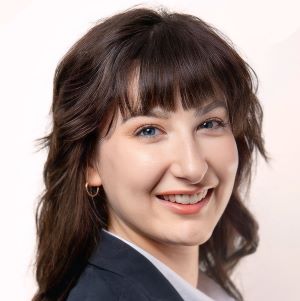
Megan Good, MD
Early Course Psychosis Fellow
Harvard Medical School, Beth Israel Deaconness Medical Center
Schizophrenia: Reflections as a Sister and a Psychiatrist
“Your sister is hearing voices. Could it be anything else?” It was 2017 and my exasperated father was asking me, his medical student daughter, to provide a non-psychiatric explanation for the auditory hallucinations my sister was experiencing. But deep down he knew the source of his daughter’s distress. We all knew. My sister was experiencing a psychotic break, the first of many in her long journey with schizophrenia. Feeling helpless, I offered my support the only way a desperate medical student knows how: I read every book and article I could find about schizophrenia.
What began as a personal crusade to help my sister quickly evolved into a robust clinical and academic interest. This passion led me to psychiatry residency and, currently, a fellowship in early-course psychosis at Harvard Medical School and Beth Israel Deaconess Medical Center. I hope to spend my medical career treating patients with schizophrenia – a vocation that I consider to be my life’s purpose. The combination of my lived experience and my professional accolades provides me with a unique view of schizophrenia, psychosis treatment, and the opportunity to advocate for my patients. With my sister’s permission, I will reflect on my journey as both a sister and a psychiatrist.
Heredity is a curious thing. Some families pass down blonde hair, color blindness, or dimples. Members of my family tend to inherit mental illness. Bipolar disorder, schizophrenia, obsessive-compulsive disorder, alcoholism, suicide, and depression speckle the branches of our family tree. “Crazy runs in the family,” my dad once wryly explained. This is a chaotic pattern of inheritance I’ve noticed in my own patients as well.
I’ve spent many sleepless nights wondering, “Why her?” There is seemingly no rhyme or reason for the strange way that schizophrenia selects its patients. I naively thought that mental illness would spare a vibrant, considerate person like my sister. Why did fate choose her to carry this heavy burden? This is only one of the “whys” of schizophrenia that never seems to leave my mind.
Despite decades of research, we do not fully understand schizophrenia’s direct cause, genetic involvement, or why treatment course varies. We will not procure answers to these questions without well-funded research endeavors. As my mentor, Dr. Matcheri Keshavan, says, “We need data.” I have a deep appreciation for clinical research and biological psychiatry. I believe these disciplines will eventually lead to our understanding of psychotic illness and aid in the development of effective treatments that fully address both symptoms and patient quality of life. Families like yours (and mine) want and deserve answers.
Despite these uncertainties, I am hopeful. The recent development of medications that work differently than traditional antipsychotics (one newly FDA-approved) bring patients much-needed treatment options. These new medications work on a different system in the brain and are theorized to have less side effects than antipsychotics. Research focus and drug development have shifted focus to address the deficits in higher-level thinking, memory, social ability, and motivation that often accompany psychotic illness. Both medication and behavioral means such as cognitive enhancement therapy (CET) address these symptoms. Patients, families, and professionals alike will attest to the great extent to which these symptoms inhibit social and occupational functioning. Addressing them is crucial. Ultimately, treatment options should not only alleviate symptoms, but also improve patients’ quality of life
Clozapine is the gold standard medication for treatment-resistant schizophrenia. Unfortunately, due to extensive monitoring and frequent lab work, it can be difficult to access for patients in certain areas of the country. CURESZ’s advocacy work to expand patient access to clozapine is helping to address a disparity in the psychiatric healthcare system. I have seen the numerous benefits of clozapine in patients and in my own sister. Shortly after starting clozapine, my sister started reading again. There was a long period in her illness where she could not focus long enough to do so. Now she returns from the library, her arms overflowing with books, excited to tell me about the latest dystopian novel she finished. I thought for sure that schizophrenia had robbed my sister of her favorite hobby, but this was simply not the case.
The manner in which I measure clinical success in my patients is two-fold. As a scientifically-minded physician, I measure progress through rating scales and lab results. As a sister and a clinician, I measure treatment success in meaningful moments and personal goals achieved. In my patients’ experience, clozapine seems to produce both.
My sister remains my first and most personal reason to spend my life caring for patients with schizophrenia and other psychotic disorders. My role as her sister greatly informs my practice as a psychiatrist. My greatest hope is that these roles will combine to create a humanistic and scientifically-informed style of practice to better serve my patients. Simply put: To me, this is personal.

